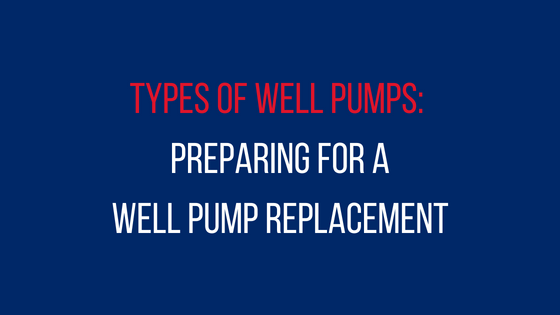Wells range in size depending on the amount of groundwater available, so naturally well pumps, drawing the water from the ground, range in size as well. If you’re replacing a failed well pump, it may be as easy as searching for a similar model in similar size with a similar horsepower as your existing unit.
But what if your family has grown and you need to pump more water? Or, what if you’d like to upgrade an old well pump to a newer, more efficient, longer lasting model?
Then it’s time to speak with a professional about your options. Before you do, here’s a basic overview of your choices. As you’re reviewing, keep in mind some of the most important factors determining what kind of well pump you should invest in:
- depth of well
- diameter of well casing
- number of household fixtures
- household water use
Centrifugal Well Pumps
One of the simplest models, centrifugal pumps are only used for shallow wells – usually less than 25 feet deep. Because of their simplicity and small size, they tend to cost less and are easiest to maintain.
Jet Pumps
Jet pumps can be used for shallow or deep wells. Jet pumps have more complex mechanics that increase the pump’s suction power. Most jet pump motors range between 1.5 and 2 horsepower.
Shallow Well Jet Pumps
Shallow well jet pumps accommodate water less than 25 feet deep. They sit above ground and draw water through one inlet pipe.
Deep Well Jet Pumps
Deep well jet pumps accommodate water from 25 to 100 feet deep (maybe more with special upgrades). They sit above ground, drawing water through an inlet pipe and pushing water through another.
Submersible Pumps
Submersible pumps can be used for shallow or deep wells up to 400 feet. As their name implies, they are designed to operate underwater. The main differences between submersible and jet pumps include:
- submersible pumps “push” water out of the well instead of “pulling” like jet pumps
- most submersible pump motors have more horsepower than jet pumps, ranging from .75 to 5 horsepower
- submersible pumps are self-priming, meaning their motors tend to last longer than jet pumps
- submersible pumps are quieter because they’re operating underwater, instead of above ground like jet pumps
Sizing Your Well Pump
Well pumps are rated in gallons per minute (GPM). The GPM for your home will depend on the number of fixtures in your home, and the number of people using water in a typical day.
Selecting a pump that is too large or too small can be detrimental to energy efficiency and pump performance, so it’s important to consult a professional when sizing.
Choosing Features on Your Well Pump
Not only will you be choosing a well pump type and model, but also you’ll find yourself choosing power, flow capacity and other features such as material. Each additional feature comes with its pros and cons. A professional can walk you through a discussion of your options, making the decision process much easier for you.
Ready to talk well pumps? Call Certified Services at 440-652-5000.



